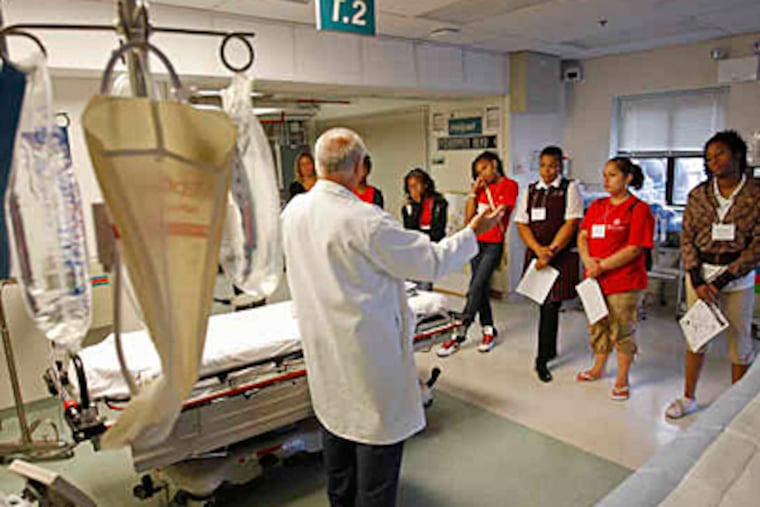Rutgers helps keep future scholars on track
A group of Camden eighth graders took a tour of Cooper University Hospital last week and caught a glimpse of what their futures could hold.

A group of Camden eighth graders took a tour of Cooper University Hospital last week and caught a glimpse of what their futures could hold.
They weren't just any eighth graders. All were members of the inaugural class of Rutgers Future Scholars, a program launched by the university a year ago to help more youngsters from low-income communities graduate from college.
"How many of you are interested in careers in the health field?" medical librarian Nancy Calabretta asked the group, gathered in Cooper's Health Resource Center.
Essence High, 13, shot up a hand.
"OB-GYN!" she declared.
A year ago, she might not have been so bold.
During the 12 months of the program, shy Essence has blossomed, said her grandmother Rita High.
"Even the teachers at school have said, 'Girl, you've come a long way,' " High said. "She's coming out of her shell."
It has been a year of growth and discovery for the first class of Rutgers Future Scholars. Of the 194 students accepted into the program from Rutgers' host cities - Camden, New Brunswick, Newark, and Piscataway - only six have left. Two moved away, and four were dismissed because they did not attend the mandatory summer program.
Over 80 percent of the Future Scholars maintained a B average or higher in their core subjects, according to program officials. Their parents have become more involved in the students' academic activities, said the administrators, and the students have increased their extracurricular participation.
"We expect great things from them, and they have responded," said program director Aramis Gutierrez.
The students, in turn, have been given the chance of a lifetime - a shot at four years tuition-free at Rutgers. To qualify, they must maintain at least a 3.0 grade-point average in high school, have good attendance, and take part in program activities. Along the way, they will be given guidance, mentoring, enrichment, and tutoring.
Intended as a model program, Future Scholars welcomed its second cohort of rising eighth graders this month.
In the Camden program this year, the 47 scholars visited the local Rutgers campus about once a month for workshops that touched on topics including academics, personal development, leadership, and career possibilities.
Sometimes, they just had fun, like on the trip to Piscataway to see the dynamic Rutgers women's basketball team play at the university's renowned Louis Brown Athletic Center.
"They were like, 'This is our school. One day this could be us,' " said Nyeema Watson, associate director of the Rutgers Center for Children and Childhood Studies, which hosts the Camden program. "It started clicking."
Now with the first group of scholars poised to enter freshman year of high school, program officials say they plan to stress scholastic skills so the students graduate ready for college, even from low-performing schools.
"From this point on, we need to increase our level of academic focus," said Jerri Pittsley, Camden program director.
The program is trying to impart knowledge the students' more privileged peers pick up through osmosis.
Business professor Gayle Porter recently prepped them on workplace etiquette: Have a firm handshake, no dead-fish fingers; make eye contact; dress for success.
One morning last week, the scholars met with local executives to learn about careers they might never have thought of.
A program requirement is that the students are children of parents who have not graduated from college. Some of their families are struggling. But many of the youngsters come with unique strengths.
Harvey Mills, 13, said that he is valedictorian this year at Veterans Memorial Middle School. He also was chosen valedictorian of the Future Scholars eighth-grade graduation, held Saturday.
Harvey was interested in playing sports, but he said the program helped him realize that few athletes go pro. Now he's thinking of a career in medicine or forensics.
"Something I'll enjoy - and make a lot of money," he said.
Feliciano Cintron, 15, said he has worked since he was 11, when a local barber took him under his wing and taught him the trade. He lived in the Virgin Islands with his father for a few months this year, he said, but he came back to the program.
"I didn't want to give it up," Feliciano said. "It's not many people can say, 'I got a scholarship to a university in the seventh grade.' "
There were no bouts of eighth-grade-itis this year for Elisabel Laluz, 14.
Being in the program, she said, "is sort of pushing me harder. Right now, I'm trying to get all A's for this marking period."
She said that her father, who works in a corner store, tried to save for her college education, but that getting into Future Scholars had allowed her to dream of a career in the medical field.
During the Cooper visit, Elisabel was in her element, intently taking notes and politely but determinedly asking the health professionals about their jobs, their training - and their pay.
Yani Munoz, 14, asked her share of questions, too. She didn't used to, she said, but that has changed.
Her mother is a manager at Wal-Mart, and her father is "not around." Yani went on the Cooper tour planning on a career in criminal justice. But then the group took the elevator way up to the hospital helipad and the trauma resuscitation room.
There, plain-talking trauma nurse David Groves told the students how he worked half his life in a warehouse only to get laid off with a family to support. He got a hospital job that paid for him to become a nurse. He told them about the work he does, some of the people he has helped. Yani was riveted.
"I like this place," she said.
Enough to work there?
Yes, she nodded.
One more for the future.